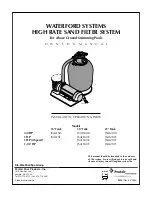
46
MAX-E-THERM
®
Pool and Spa Heater Installation and User’s Guide
P/N S794 Rev. H 8-11-14
AFTER START-UP
CHECKING WATER FLOW
WARNING
Fire or flooding hazard.
If the unit overheats and the burner fails to shut off, follow instructions under “To Turn Off Gas to the Appliance”,
page 33
, and call a qualified service technician to repair unit
.
After start-up, the outlet water pipe should feel slightly warmer than the inlet pipe. If it feels hot, or if you hear the water in the heater
boiling, there may not be enough water flow to the appliance. Make sure that the filter is not plugged. If water temperature remains high
but the unit continues to operate, turn off the appliance and call your service technician.
SPRING AND FALL OPERATION
If the pool is only used occasionally, lower the pool thermostat to 68° F (20° C) and leave the heater on. This will keep the pool and the
surrounding ground warm enough so that the heater should restore the pool to a comfortable temperature within about one day.
WINTER OPERATION
CAUTION
• Operating this heater continuously at water temperatures below 68° F.
(20° C) will cause harmful condensation and will damage the heater and
void the warranty.
• If the heater has been drained for freezing condition, do NOT turn "ON"
until the system is circulating water.
• Water trapped in the heat exchanger can result in freeze damage to the
exchanger or headers. Freeze damage is specifically not covered by the
warranty.
• When starting the heater for the swimming season with a water
temperature below 50° F (10° C), the heater may be used to heat the
water; however, make sure that the heater operates continuously until
the water temperature reaches the heater’s minimumsetting of 68° F
(20° C). During cold weather, if there is no danger of freezing, operate
the filter pump continuously even if the heater is not operating. If air
temperatures are expected to drop below freezing (32° F/0° C), shut
down the heater and winterize it.
For outdoor heaters in freezing climates, shut the heater down and
drain it for winter as follows, see
Figure 38
:
1.
Turn off electrical supply to the heater and pump.
2.
Close main gas control valve and manual gas valve (located outside the heater). Turn switch on heater gas valve to OFF.
3.
In northern climates where they may be required, open drain cock located on the bottom of the manifold adapter, and drain the heat
exchanger and manifold adapter completely. If heater is below pool water level, be sure to close isolation valves to prevent
draining the pool (isolation valves are not required and should not be used on heaters installed above pool water level except
when needed for winterizing valves). Assist the draining by blowing out the heat exchanger through the pressure switch fitting
with low pressure compressed air (less than 5 PSI or 35 kPa).
WARNING
Explosion hazard.
Purging the system with compressed air can cause components to explode, with risk of severe injury or death to anyone
nearby. Use only a low pressure (below 5 PSI or 35 kPa), high volume blower when air purging the heater, pump, filter, or piping.
4.
Remove the Water Pressure Switch. Plug the port in the manifold to prevent bugs and dirt from getting into the manifold.
5.
Drain the plastic inlet/outlet manifold through the outlet pipe. If the pipe does not drain naturally to the pool, install a drain cock
in the outlet pipe to drain the manifold.
6.
Cover air inlet grate with a plastic bag to prevent bugs, leaves, etc., from getting into the heater.
NOTICE:
Water trapped in the heater can cause freeze damage. Allowing the heater to freeze voids the warranty.
To return the heater to service after winterizing:
1.
Close drain cock and fittings.
2.
Before starting the heater, circulate water through the heater for several minutes until all air noises stop. See also “BEFORE
START-UP” (
page 32
) and “CARE AND MAINTENANCE” (
page 45
).
(See additional notes under Important Notices in Introduction.)
Section 5. Maintenance
Open
Petcock
Manual/Gas Valve OFF
Power
Close Isolation Valves
Drain Cock(s) and Plugs
OPEN
Outlet
Inlet
nifold
Junction
Junction
Gas Control Valve
Throw switch
to OFF
Figure 38.











































